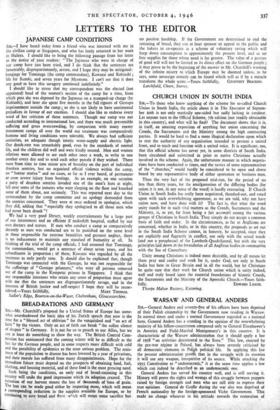LETTERS TO THE EDITOR
JAPANESE CAMP CONDITIONS
Sta,—I have heard today from a friend who was interned with me in the civilian camp at Singapore, and who has lately returned to her work in Malaya. I should like to bring the following passage from her letter to the notice of your readers: "The Japanese who were in charge of our camp have just been tried, and I do think that the sentences are lamentably, disproportionately, severe, and I hope they may be mitigated: hangings for Tominaga (the camp commandant), Kawazai and Kobiashi ; life for Suzuki, and seven years for Myamoto. I can't see that it does any good- to have this savagery continued indefinitely."
I should like to stress that my correspondent was the elected (not appointed) head of the women's section of the camp for a time, from which post she was deposed by the Japanese on a trumped-up charge (by Kobiashi), and later she spent five months in the full rigours of Gestapo imprisonment outside the camp = so she is not likely to have sentimental prejudices in favour of our enemies. I should also like to endorse every word of her criticism of these sentences. Though our camp was not conducted according to international law, and there was much preventible suffering and gross overcrowding, by comparison with many enemy internment camps all over the world our treatment was comparatively humane and living conditions were tolerable. We always had sufficient sanitation, an adequate though erratic water-supply and electric light. Our death-rate was remarkably good, even by the standards of normal life, and the children did well and were kindly treated. Men and women relatives were allowed to see each other once a week, to write to one another every day and to send each other parcels if they wished. There were from time to time minor acts of brutality on the part of individual drunken sentries, but no organised official violence within the camp, no " horror stories " and no cases, as far as I ever heard, of permanent or even severe injury from beatings. As an example, on one occasion a party of drunken sentries invaded one of the men's huts at night, fell over some of the inmates who were sleeping on the floor and knocked some of them about, not seriously. This was reported next day to the commandant by the camp committee and an apology demanded from the sentries concerned. They were at once ordered to apologise, which they did, adding that " especially they apologised to all those men who had never been drunk "!
We had a very good library, weekly entertainments for a large part of our internment and an efficient if makeshift hospital, staffed by our own doctors and nurses. If men who conduct a camp as comparatively decently as ours was conducted are to be punished on the same level as those responsible for extreme brutalities and grossest neglect, there is no inducement to maintain any standard of humanity at all. In thinking of the trial of the camp officials, I had assumed that Tominaga, the commandant, would get a sentence of about seven years, and his subordinates in proportion ; of these, Kawazai was regarded by all the internees as only partly sane. It should also be explained that, though Tominaga was connected with the Gestapo, he was not responsible for the sufferings of " Gestapo prisoners," who were all persons removed out of the camp to the Kempetai prisons in Singapore. I think that any responsible internees who retain any sense of proportion must agree with me that the sentences are disproportionately savage, and in the interests of British justice and self-respect I hope they will be recon-






























 Previous page
Previous page